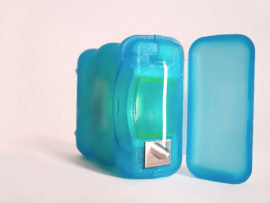Dentist Near Me

Discomfort and pain in your jaw, clicking while you talk or chew, and swelling on the sides of your face can be caused by Temporomandibular Joint Disorder (TMD). TMD can make talking and eating both painful and uncomfortable. Our team understands how TMD can make your day a challenge. We’ve compiled a list of helpful tips for managing TMD discomfort, but also encourage you to schedule a visit to see us for a full evaluation.
Finding Relief at Home
If your jaw is swollen, try applying a cold compress to your face. We recommend holding the compress in place for about 10 minutes. If you are able, try a few gentle jaw stretches. After the cold compress, apply warm, moist heat to the same area. You can keep this warm compress in place for an additional 5 to 10 minutes.
If your discomfort is particularly noticeable, try over-the-counter pain relievers such as nonsteroidal anti-inflammatory drugs (NSAIDs) or ibuprofen. If you find yourself taking pain relieving medications daily, please contact us immediately.
The “Don’ts” of TMD
Applying excess pressure to your jaw can make your TMD discomfort worse. Don’t use your hand as a rest for your chin, as doing so increases the amount of pressure and strain placed on your jaw. If you talk on the phone frequently, avoid holding the phone on your shoulder while bending your neck to keep it in place.
Clenching your jaw and keeping your teeth tightly closed can also lead to a build-up of pressure in the jaw. During the day, try to keep your teeth from touching. By create a little space between your teeth, you will be relieving pressure from your jaw.
Contact Us
Our team is here to help you. Schedule a consultation with our dentist to learn more about the solutions available for people just like you dealing with TMD discomfort. We will provide a thorough examination to determine the best course of treatment for your TMD. Relief may be closer than you think. Contact our dental team to learn more today.
540 West Hill St.
Thomson, GA 30824
Phone:(706) 595-5152


 Keeping up optimal oral health takes more than brushing and flossing. Maintaining oral hygiene demands a bit of work, but it is worth it in the long run. Here are four ways you can improve your dental health right now.
Keeping up optimal oral health takes more than brushing and flossing. Maintaining oral hygiene demands a bit of work, but it is worth it in the long run. Here are four ways you can improve your dental health right now. You may not realize it, but you could be at risk of developing an unsightly medical condition known as hairy tongue. While it is harmless in most cases, hairy tongue is still an unpleasant ailment. The causes are not always completely known, but practicing good oral hygiene at home and visiting our dental office for cleanings can help prevent the issue. Here’s what you need to know.
You may not realize it, but you could be at risk of developing an unsightly medical condition known as hairy tongue. While it is harmless in most cases, hairy tongue is still an unpleasant ailment. The causes are not always completely known, but practicing good oral hygiene at home and visiting our dental office for cleanings can help prevent the issue. Here’s what you need to know. Men, dental examinations and treatment are important for you, too. Did you know according to the Academy of General Dentistry (AGD), by age 72 men lose an average of 5 teeth? That number jumps to 12 if you are also a smoker. Here’s what you need to know about keeping your mouth healthy. Follow these tips and you can beat the odds stacked against men and their oral health.
Men, dental examinations and treatment are important for you, too. Did you know according to the Academy of General Dentistry (AGD), by age 72 men lose an average of 5 teeth? That number jumps to 12 if you are also a smoker. Here’s what you need to know about keeping your mouth healthy. Follow these tips and you can beat the odds stacked against men and their oral health. Loose teeth, bad breath, and painful, bloody gums – these are among the signs and symptoms of periodontal, or gum, disease. Unfortunately, periodontal disease can also begin without any obvious symptoms. If left undiagnosed or untreated, you could be at risk for irreparable damage to your teeth and gums. The good news is that periodontal disease is preventable. In fact, one of the most effective tools for preventing the disease only takes a minute of your time each day.
Loose teeth, bad breath, and painful, bloody gums – these are among the signs and symptoms of periodontal, or gum, disease. Unfortunately, periodontal disease can also begin without any obvious symptoms. If left undiagnosed or untreated, you could be at risk for irreparable damage to your teeth and gums. The good news is that periodontal disease is preventable. In fact, one of the most effective tools for preventing the disease only takes a minute of your time each day.




